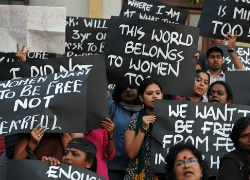It’s ironic that in India – which proudly proclaims a rich, ancient heritage and where the very symbol for strength and power in ancient scriptures is female (Shakti) – women today are struggling for a safe and dignified environment.
I was visiting India when a 23-year-old physiotherapy student, a victim of a brutal sexual assault in New Delhi in mid-December, was clinging to life in a hospital. She had been raped and severely beaten aboard a moving bus and eventually thrown out of the bus to die. Two weeks later, she succumbed to her internal injuries.
Police arrested five men accused of this heinous crime. They face rape, kidnapping and murder charges.

(Dawn)
Typically in India, sexual crimes receive only cursory attention. They therefore go unreported and trials drag on forever. But this time there was extensive media coverage and unprecedented outrage all over the country. It seemed like a wake-up call, which led to peaceful demonstrations, especially by young people demanding an expedited trial, reform of outdated criminal laws, and effective implementation and enforcement of existing laws.
I was taken aback by the government’s initial response: Police used tear gas and water cannons to disperse the crowds, primarily college students. Law enforcement authorities barricaded roads and imposed emergency measures to crush the largely peaceful protests.
I was equally struck by the intensity of anger and resolve among my relatives and friends. My nephew and niece in New Delhi and their families were out on the streets with the protesters, a first-ever for them. New Year’s Eve, usually marked with joyous festivities, was a sober candlelight vigil, where several thousands gathered to remember and honor the victim. A similar scenario was witnessed all over India.
Day after day, the protests continued. Political leaders, who typically lead demonstrations and protests in India, were conspicuous in their absence. People were so angry at the politicians for their lack of sensitivity that when the chief minister of Delhi eventually showed up at a gathering after a few days, she was shouted down and had to leave. Public pressure mounted, forcing the government to act. The Home Ministry appointed a three-member commission, chaired by a former chief justice of the Supreme Court of India. The commission received more than 8o,000 suggestions for reforms to the criminal justice system.
The commission called for strict enforcement of sexual assault laws and tougher jail terms for offenders. It urged the legislature to amend the country’s antiquated criminal code and recommended specific changes, including requiring police officers to register every case of·precluding people charged with criminal offenses from holding political office. To expedite these and future sex-offense trials, the government has established special “fast-track” courts.
Mahalakshmi Mahalingam, a social worker who formerly managed a 24-hour rape crisis hot line for the Rape Assistance and Awareness Program in Denver, lamented that “in India, victim blaming is the norm. The current situation bears testimony to how bitter and enraged women are about sexual abuse, coercion and rape.”
The night before India’s Republic Day, which celebrates the enactment of its constitution, President Pranab Mukherjee described the Delhi attack as a “grave tragedy that has shattered complacency.” He called for the nation “to reset its moral compass.”
Eve Ensler, founder of the One Billion Rising campaign, which addresses violence against women, said at a press conference in Delhi, “With the discussion on sexual violence, the window to women’s equality is open wider here than I’ve ever seen.” I hope she’s right.
Ved P. Nanda is Thompson G. Marsh Professor of Law and director of the International Law Program at the University of Denver Sturm College of Law.


